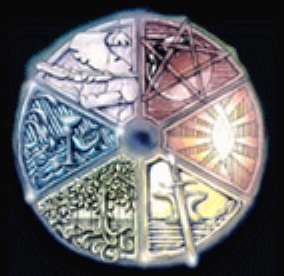

The most accomplished sorcerers of each Convocation are able to climb
with great effort to the pinnacle of the Pvaric arts,
which lies at the centre of the Great Wheel, where the differences
between the convocations fade. Such sorcerers are known as Grey
Mages, and only they may originate new spells within the realm of
Neutrality (indeed, they regard all magic as Neutral, and may
originate spells of any type).
Pvaric Magery
Option: It's possible to have "weaker" Pvaric mages. For an effective "Magery 2" in your Primary Convocation, and similarly lower levels of Magery with the other convocations (which means no ability with Diametric spells), pay 20 points. For an effective "Magery 1" in your Primary Convocation (and Magery 0 in the Secondary Convocations, and no ability in the Teriary or Diametric Convocations), pay 12 points.
The "standard" beginning Shek-Pvar PC has recently finished apprenticeship and started on his "journey" -- such a character should have about 10-20 points in spells, and is only allowed to know Primary and Neutral spells. Also, some other things should have been studied: All Shek-Pvar should be Literate, and have a fair general education in such skills as Theology (Triadic), History, Philosophy (Pvaric), Thaumatology, and probably a bit of Heraldry and Savoir-Faire. Since Mavari usually have to lend a hand in housekeeping (to teach humility as much as to get the housekeeping done; Mavari are largely drawn from nobility and the upper crust of the guilded class, which are not likely to be accustomed to manual labor from childhood), they might have a point or two in skills such as Cookery or Agronomy. Also, the different Convocations have separate "recommended" (i.e., almost required) skills:
To become a Gray Mage, you need a thorough schooling in all
Convocations; the requirement is that you have put at least one point
in each of at least 10 spells in each Convocation (and Neutrality),
requiring at the very least 70 points in spells. When this
requirement is met, the candidate must find a Gray Mage to help him
across the threshold (or somehow improvise another way -- there must
have been a first Gray Mage, at least), which boils down to receiving
7 points' worth of private tutoring (equating to 1400 hours, or 175
full eight-hour days). Once this is done, the character is a Gray
Mage, with global Magery 3.
Social Organization
The organization of the Shek-Pvar is rather complicated. Suffice to
say that they have four basic degrees: Mavari, Satia-Mavari, Shenava
and Viran. These may be translated as Apprentice, Journeyman, Master
and Honored Doctor. Apprenticeship usually begins no earlier than at
age 14 (cases are known of apprentices well above 50), and concludes
after about seven years, at which time custom dictates that the new
Satia-Mavari leaves his place of apprenticeship and spends at least a
year travelling in the world and doing further studies and research
on his own. If the Satia-Mavari later returns and shows himself to
have made a significant contribution to the Art (usually in the form
of newly researched spells or otherwise relevant knowledge gathered
by his own efforts), he is elevated to the rank of Shenava; only about
half of all Satia-Mavari ever qualify. The rank of Viran is a purely
social one, a sort of "inner circle" into which one is only admitted
by invitation. It is reserved for those Shenava who over the years
have built an exceptional reputation for skill and wisdom; only about
ten to twenty percent of all Shenava ever make it to Viran.
The Shek-Pvar are not numerous; there are perhaps two hundred Shenava and Viran in all of Hârn, and maybe twice that many of lower than Shenava degree; these numbers seem to be fairly stable over the generations. Most Shek-Pvar are found in Chantries, which are a sort of almost monastic magical college; most Chantries are somewhat isolated from the outside world, but there are some which lie in the middle of towns. There is a significant minority of Shek-Pvar who live and work on their own, however, and some keep their location or even existence secret from their brethren. The greatest concentration of Shek-Pvar is in Melderyn, where almost all Hârnic Chantries are located; there is a similar concentration in Emelrene (which is Melderyn's "twin kingdom" on the Lythian mainland).